
Theatre 40’s revival of Dangerous Corner, J.B. Priestley’s 1932 London and Broadway mystery thriller, is both a well realized period play, with attention paid to costumes, hair, and set design, and a surprisingly modern piece of theater with plot twists any contemporary playwright would be proud of. Fast paced, well acted and directed, and authentically designed to take the audience back seventy-five years, Dangerous Corner is a suspenseful and conversation-provoking treat.
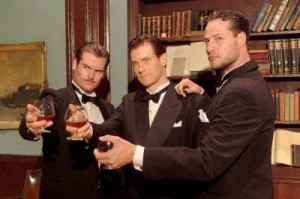 In a darkened living room, party guests are listening to a “turgid (radio)melodrama” entitled The Sleeping Dog. The lights come up on an elegantly dressed trio of attractive young women and an older female mystery novelist.They discuss the possible meaning of the title. Does it mean that the lead character (“the sleeping dog”) lies, i.e. tells lies? Or are there some secrets that are better not revealed, i.e. let sleeping dogs lie? Joined by the husbands of two of the women and the third woman’s fiancé, conversation turns to the “dangerous corners” we encounter in life as we “skid around a corner at 60 miles per hour.” What is the truth? they ponder. Are the facts, asks one of them, only half of the truth?
In a darkened living room, party guests are listening to a “turgid (radio)melodrama” entitled The Sleeping Dog. The lights come up on an elegantly dressed trio of attractive young women and an older female mystery novelist.They discuss the possible meaning of the title. Does it mean that the lead character (“the sleeping dog”) lies, i.e. tells lies? Or are there some secrets that are better not revealed, i.e. let sleeping dogs lie? Joined by the husbands of two of the women and the third woman’s fiancé, conversation turns to the “dangerous corners” we encounter in life as we “skid around a corner at 60 miles per hour.” What is the truth? they ponder. Are the facts, asks one of them, only half of the truth?
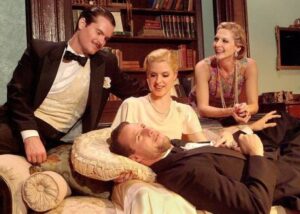 The hosts of the dinner party are Robert, the head of a publishing firm, and his wife Freda. Their guests are Gordon and his wife Betty, Charles and his fiancée Olwen, and novelist Miss Mockeridge. They begin to discuss the apparent suicide of Robert’s younger brother Martin, apparently due to the guilt he felt over having stolen a large sum of money from the firm. When Olwen remarks that she has already seen the black lacquered box on the mantle (which had belonged to Martin), questions begin to arise. How could she have seen it? Who was the last person to see Martin alive? Why did Martin tell two people two different stories about who he suspected had stolen the money? And this is just the tip of the iceberg, leading to a shocking revelation, and lights down on Act 1.
The hosts of the dinner party are Robert, the head of a publishing firm, and his wife Freda. Their guests are Gordon and his wife Betty, Charles and his fiancée Olwen, and novelist Miss Mockeridge. They begin to discuss the apparent suicide of Robert’s younger brother Martin, apparently due to the guilt he felt over having stolen a large sum of money from the firm. When Olwen remarks that she has already seen the black lacquered box on the mantle (which had belonged to Martin), questions begin to arise. How could she have seen it? Who was the last person to see Martin alive? Why did Martin tell two people two different stories about who he suspected had stolen the money? And this is just the tip of the iceberg, leading to a shocking revelation, and lights down on Act 1.
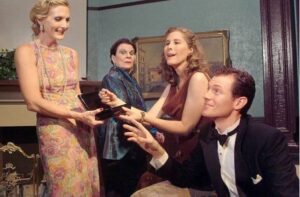 In many ways Dangerous Corner is as contemporary as a nighttime soap, as, one after another, characters are revealed to be in love, though not with their spouse or fiancé/e. Also, one tends to forget that unlike Hollywood movies of the era , Broadway plays in the 30s through the 50s were much more willing to deal with taboo themes; Martin, it seems, was the great love of one of the men. And in a brilliant final twist, Priestly allows us to see to what extent a single word (spoken or unspoken) can have fateful and far-reaching consequences.
In many ways Dangerous Corner is as contemporary as a nighttime soap, as, one after another, characters are revealed to be in love, though not with their spouse or fiancé/e. Also, one tends to forget that unlike Hollywood movies of the era , Broadway plays in the 30s through the 50s were much more willing to deal with taboo themes; Martin, it seems, was the great love of one of the men. And in a brilliant final twist, Priestly allows us to see to what extent a single word (spoken or unspoken) can have fateful and far-reaching consequences.
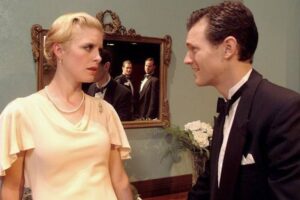 Director Bruce Gray has kept the pace snappy and the characters in motion, a must in a “drawing room” drama, and his cast of seven (Joe Briggs, Christine Joëlle, Laura Jones, Julie Lancaster, Grinnell Morris, Shawn Savage, and Nan Tepper) all have excellent moments. The outstanding Lancaster and Morris, as Freda and Robert, are especially adept at recreating the sophisticated and slightly heightened speech and manner of the 30s.
Director Bruce Gray has kept the pace snappy and the characters in motion, a must in a “drawing room” drama, and his cast of seven (Joe Briggs, Christine Joëlle, Laura Jones, Julie Lancaster, Grinnell Morris, Shawn Savage, and Nan Tepper) all have excellent moments. The outstanding Lancaster and Morris, as Freda and Robert, are especially adept at recreating the sophisticated and slightly heightened speech and manner of the 30s.
The design team is also first rate, with special mention due to Jeff G. Rack’s beautifully detailed set, with its marble fireplace, period black and white photos, books, clocks, and the large radio console. Lani Bartlett’s costumes capture the look of the period (though the seamless stockings are an anachronism). With the men’s hair slicked back and the women’s in elegant chignons, only Jones’ do seems a bit anachronistic. Meghan Hong captures the warm light of a room lit by table and wall lamps, and Marc Olevin’s sound design incorporates authentic sounding radio dramas.
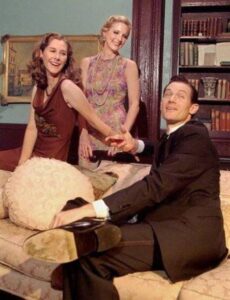 Dramaturg Jan Fischer, working with director Gray and Priestley’s original British script, has been able to flesh out the characters from Priestley’s American version as adapted by Andrew Robinson.
Dramaturg Jan Fischer, working with director Gray and Priestley’s original British script, has been able to flesh out the characters from Priestley’s American version as adapted by Andrew Robinson.
Far more than most 1930s plays, Dangerous Corner is surprisingly undated, and as staged by Theatre 40 is a gripping and suspenseful hour and a half of crackerjack entertainment.
Reuben Cordova Theatre on the Campus of Beverly Hills High School
241 S Moreno Dr., Beverly Hills.
www.Theatre40.org
–Steven Stanley
October 16, 2007
Photos: Ed Krieger


 Since 2007, Steven Stanley's StageSceneLA.com has spotlighted the best in Southern California theater via reviews, interviews, and its annual StageSceneLA Scenies.
Since 2007, Steven Stanley's StageSceneLA.com has spotlighted the best in Southern California theater via reviews, interviews, and its annual StageSceneLA Scenies.







 COPYRIGHT 2024 STEVEN STANLEY :: DESIGN BY
COPYRIGHT 2024 STEVEN STANLEY :: DESIGN BY